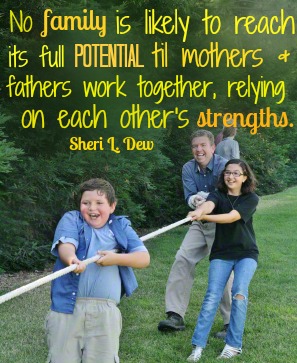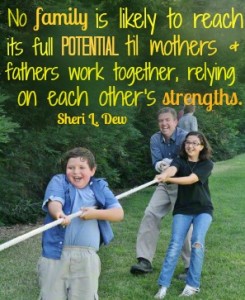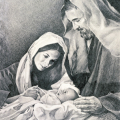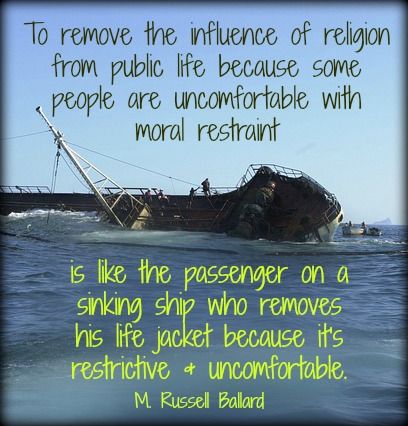The world today is trying to redefine what a family is. But the more society tries to change the lineup, the more we discover just how important each parent is in a child’s life. I didn’t really appreciate how much I relied on my husband’s help until we moved hundreds of miles away from family and his new job required him to travel a lot. I discovered very quickly just how difficult it is to be a single parent—even if it was temporary. Research supports this as well. The National Fatherhood Initiative reports:
Many people are surprised at what research shows with respect to the connection between father absence and an increase in social problems in America, including poverty, teen pregnancy, juvenile delinquency, physical abuse, suicide, substance and alcohol abuse and a host of other troubling social problems. [1]
Recently, two diverse publications—the Deseret News (owned and operated by The Church of Jesus Christ of Latter-day Saints, which is sometimes inadvertently called the Mormon Church) and The Atlantic (owned by Washington entrepreneur David Bradley)—teamed up to produce a 4-part series on fatherhood and American family life. Paul Edwards, editor of the Deseret News, said:
So often the issues of family are used as a wedge issue in politics. We thought, wouldn’t it be interesting if two quite different publications— one aimed at a values-oriented heartland audience, The Atlantic providing thought-provoking insight to a coastal elite— could actually say something substantive. [2]
The result is an insightful look at why dads really do matter, how we can prepare our sons for this important role and why the traditional family is really the best option.
The Fundamental Importance of Family
The family is the foundational unit of society. It’s where we learn our values, our sense of right and wrong and where we form our identity. The First Presidency and Quorum of the Twelve Apostles (together, the governing body of The Church of Jesus Christ) issued The Family: A Proclamation to the World, which states:
The family is ordained of God. Marriage between man and woman is essential to His eternal plan. Children are entitled to birth within the bonds of matrimony, and to be reared by a father and a mother who honor marital vows with complete fidelity. … By divine design, fathers are to preside over their families in love and righteousness and are responsible to provide the necessities of life and protection for their families. Mothers are primarily responsible for the nurture of their children. In these sacred responsibilities, fathers and mothers are obligated to help one another as equal partners.
Elder L. Tom Perry, an Apostle of Jesus Christ, said:
It appears to me that the crosshairs of Satan’s scope are centered on husbands and fathers. Today’s media, for example, have been relentless in their attacks—ridiculing and demeaning husbands and fathers in their God-given roles. …
Satan, in his carefully devised plan to destroy the family, seeks to diminish the role of fathers. A family needs a father to anchor it. Surely we have learned by now, from the experience over centuries, that the basic family provides the most stable and secure foundation for society and is fundamental to the preparation of young people for their future responsibilities. We should have learned by now that alternate styles of family formations have not worked and never will work. [3]
Children need the stability of both parents to have the greatest opportunities for success in life. Elder Dallin H. Oaks, an Apostle of Jesus Christ, said:
Of utmost importance to the well-being of children is whether their parents were married, the nature and duration of the marriage, and, more broadly, the culture and expectations of marriage and child care where they live. Two scholars of the family explain: “Throughout history, marriage has first and foremost been an institution for procreation and raising children. It has provided the cultural tie that seeks to connect the father to his children by binding him to the mother of his children. Yet in recent times, children have increasingly been pushed from center stage.” [4]
No-fault divorce laws and other trends that weaken the definition of marriage and family are taking their toll on the children. Elder Oaks continued:
Children are the first victims of current laws permitting so-called “no-fault divorce.” From the standpoint of children, divorce is too easy. Summarizing decades of social science research, a careful scholar concluded that “the family structure that produces the best outcomes for children, on average, are two biological parents who remain married.” A New York Times writer noted “the striking fact that even as traditional marriage has declined in the United States … the evidence has mounted for the institution’s importance to the well-being of children.” That reality should give important guidance to parents and parents-to-be in their decisions involving marriage and divorce. We also need politicians, policy makers, and officials to increase their attention to what is best for children in contrast to the selfish interests of voters and vocal advocates of adult interests.
Children are also victimized by marriages that do not occur…. Unmarried mothers have massive challenges, and the evidence is clear that their children are at a significant disadvantage when compared with children raised by married parents. … For children, the relative stability of marriage matters. We should assume the same disadvantages for children raised by couples of the same gender. [4]
Dads Make a Difference
Fathers provide an anchor for their families. They are the protective force in their children’s lives. In The Church of Jesus Christ, there is a children’s song called “Fathers,” which says:
Fathers are so special with a very special love.
They guide us and protect us.
They guide us and direct us back to our home above.
Fathers and mothers each have their own distinct and important roles in the family—both essential to the welfare and development of their children. The late President James E. Faust, until his death, an Apostle of Jesus Christ, said:
… Sociologically, it is now painfully apparent that fathers are not optional family baggage. We need to honor the position of the father as the primary provider for physical and spiritual support. … It is useless to debate which parent is most important. No one would doubt that a mother’s influence is paramount with newborns and in the first years of a child’s life. The father’s influence increases as the child grows older. However, each parent is necessary at various times in a child’s development. Both fathers and mothers do many intrinsically different things for their children. Both mothers and fathers are equipped to nurture children, but their approaches are different. Mothers seem to take a dominant role in preparing children to live within their families (present and future). Fathers seem best equipped to prepare children to function in the environment outside the family.
One authority states: “Studies show that fathers have a special role to play in building a child’s self-respect. They are important, too, in ways we really don’t understand, in developing internal limits and controls in children.” He continues, “Research also shows that fathers are critical in establishment of gender in children. Interestingly, fatherly involvement produces stronger sexual identity and character in both boys and girls. It is well established that the masculinity of sons and the femininity of daughters are each greater when fathers are active in family life.” (Karl Zinsmeister, “Do Children Need Fathers?” Crisis, Oct. 1992.) [5]
Fathers help to prepare their children for life outside the home in several ways, according to Warren Farrell, author of “Father and Child Reunion”—for example, children with fathers around are more likely to succeed academically and less likely to use drugs. “Dad also helps with impulse control and memory and enhances a child’s ability to respond effectively to new or ambiguous situations, for boys and girls,” Farrell said. [6]
What Happens When One Parent is Gone?
But what happens when the father is absent from the home—or a child has a string of father figures coming into and out of his or her life? The result is chaos and instability—especially for the children. Elder Jeffrey R. Holland, an Apostle of Jesus Christ, said:
…I suppose no book I have read in recent months has alarmed me more than a work entitled Fatherless America. In this study the author speaks of “fatherlessness” as “the most harmful demographic trend of this generation,” the leading cause of damage to children. It is, he is convinced, the engine driving our most urgent social problems, from poverty to crime to adolescent pregnancy to child abuse to domestic violence. Among the principal social issues of our time is the flight of fathers from their children’s lives.
Of even greater concern than the physical absenteeism of some fathers is the spiritually or emotionally absent father. These are fatherly sins of omission that are probably more destructive than sins of commission. Why are we not surprised that when 2,000 children of all ages and backgrounds were asked what they appreciated most about their fathers, they answered universally, “He spends time with me”? [7]
I guess as a child I took it for granted that my dad was always there. I don’t remember him ever missing a concert, game, activity or event that I was in. He did the same for each of my seven siblings. But there was a family in our ward who didn’t have a dad in the house. And I also remember my dad taking their sons with him and my brothers on the father-son campouts and the Pinewood Derby races. And he took their daughters with my sisters on the daddy-daughter dates. Whenever they were at our home, he loved them just like he loved us. I don’t think I appreciated it as much then as I do now, when I see my husband playing with children we know who don’t have a father in their lives. I see the joy in their faces as they soak in the pure love of a father figure. And I am grateful for my father and my husband, and the fathers that they are.
In the introduction to “Wayward Sons,” a report produced for Washington think tank Third Way, scholar Elaine C. Kamarck and Third Way president Jonathan Cowan wrote:
There is a great deal of evidence that children from single-parent homes have worse outcomes on both academic and economic measures than children from two-parent families. There is a vast inequality of both financial resources and parental time and attention between one- and two-parent families. [6]
The so-called “family churn”—where parents split up and then mom and/or dad bring one or more new partners into the family dynamic—also adds to the chaos and instability of American family life. This can become even more difficult for children when siblings are born out of these new relationships. One Utah man, Jordan Ott, who was interviewed for the series was the third of his mom’s six children from 4 different marriages. The article states:
By age 8, he’d had two stepfathers; his brothers and sisters had more or fewer, based on birth order. Each child also had different numbers of siblings, depending on whether their own dads fathered other children. Ott has one full sister, four half-siblings and at one point had three step-siblings “that I know of,” he said. His own father has mostly lived far away. [6]
What about those three stepdads—one that Ott had for years? Ott said, “If I did something wrong and needed discipline, he was all over it. Otherwise, we didn’t have too much to do with each other.” The father figure was there—but Ott still didn’t have a father. Andrew J. Cherlin, author of “The Marriage-Go-Round” and the director of the Hopkins Population Center at John Hopkins University, said, “I think there’s consensus that cultural and family factors are causing children’s family lives to be more unstable than in the past.” [6]
On the other end of the spectrum are single dads, who are raising their children without the help of mom. In 1960, only 1% of households with minor children were headed by a single father; today it’s 8%, according to a recent Pew Research study. That’s a nearly nine-fold increase, from less than 300,000 households in 1960 to more than 2.6 million in 2011. Compare that with the number of single-mom households, which increased approximately four-fold in the same time period—from 1.9 million in 1960 to 8.6 million in 2011. [8]
It doesn’t matter which parent is absent—either way, there is a void in a child’s life.
Empowering Our Boys and Our Men
In the chaos of today’s world, some men and boys seem to have lost their way or become complacent. Elder D. Todd Christofferson, an Apostle of Jesus Christ, said:
In their zeal to promote opportunity for women, something we applaud, there are those who denigrate men and their contributions. They seem to think of life as a competition between male and female—that one must dominate the other, and now it’s the women’s turn. Some argue that a career is everything and marriage and children should be entirely optional—therefore, why do we need men? In too many Hollywood films, TV and cable shows, and even commercials, men are portrayed as incompetent, immature, or self-absorbed. This cultural emasculation of males is having a damaging effect. …
Some men and young men have taken the negative signals as an excuse to avoid responsibility and never really grow up. In an observation that is too often accurate, one university professor remarked, “The men come into class with their backward baseball caps and [their lame] the ‘word processor ate my homework’ excuses. Meanwhile, the women are checking their day planners and asking for recommendations for law school.” [9]
As parents as and a society, we need to empower our young men—as well as our young women. We must teach them the correct way to stand up for themselves in the world while respecting those who came before them. Elder Christofferson’s words to the men in The Church of Jesus Christ are applicable to all men today:
… We must be men that women can trust, that children can trust, and that God can trust. … We cannot afford to have boys and men who are drifting. We cannot afford young men who lack self-discipline and live only to be entertained. We cannot afford young adult men who are going nowhere in life, who are not serious about forming families and making a real contribution in this world. We cannot afford husbands and fathers who fail to provide spiritual leadership in the home. We cannot afford to have those who … waste their strength in pornography or spend their lives in cyberspace (ironically being of the world while not being in the world). [9]
The future of our nation lies in the strength of our families—who teach the rising generation their values, beliefs and moral foundation. Young men need to understand their role in society now—and to their families in the future. Elder Christofferson said:
Young men, you need to do well in school and then continue your education beyond high school. Some of you will want to pursue university studies and careers in business, agriculture, government, or other professions. Some will excel in the arts, music, or teaching. Others will choose a military career or learn a trade. Over the years, I have had a number of craftsmen work on projects and repairs at my home, and I have admired the hard work and skill of these men. In whatever you choose, it is essential that you become proficient so that you can support a family and make a contribution for good in your community and your country. …
You adult men … be worthy models and help the rising generation of boys become men. Teach them social and other skills: how to participate in a conversation, how to get acquainted and interact with others, how to relate to women and girls, how to serve, how to be active and enjoy recreation, how to pursue hobbies without becoming addicted, how to correct mistakes and make better choices. [9]
Fathers really are an important factor in a child’s life—and so are mothers. Men and women, husbands and wives, mothers and fathers must work together for the good of our children. Stability matters in the life of a child. Children learn confidence and security when mom and dad leave for a few hours—and then come back. They learn to respect and value others as they are respected and valued at home. As the winds of society shift to and fro concerning marriage and the family, it is becoming increasingly clear that traditional marriage provides the strongest foundation for family life.
Part 1 The father factor: What happens when dad is nowhere to be found?
Part 2 Why the number of single dads is on the rise
Part 3 Should welfare programs pay more attention to dads?
Part 4 How apprenticeships empower fathers and strengthen marriages






